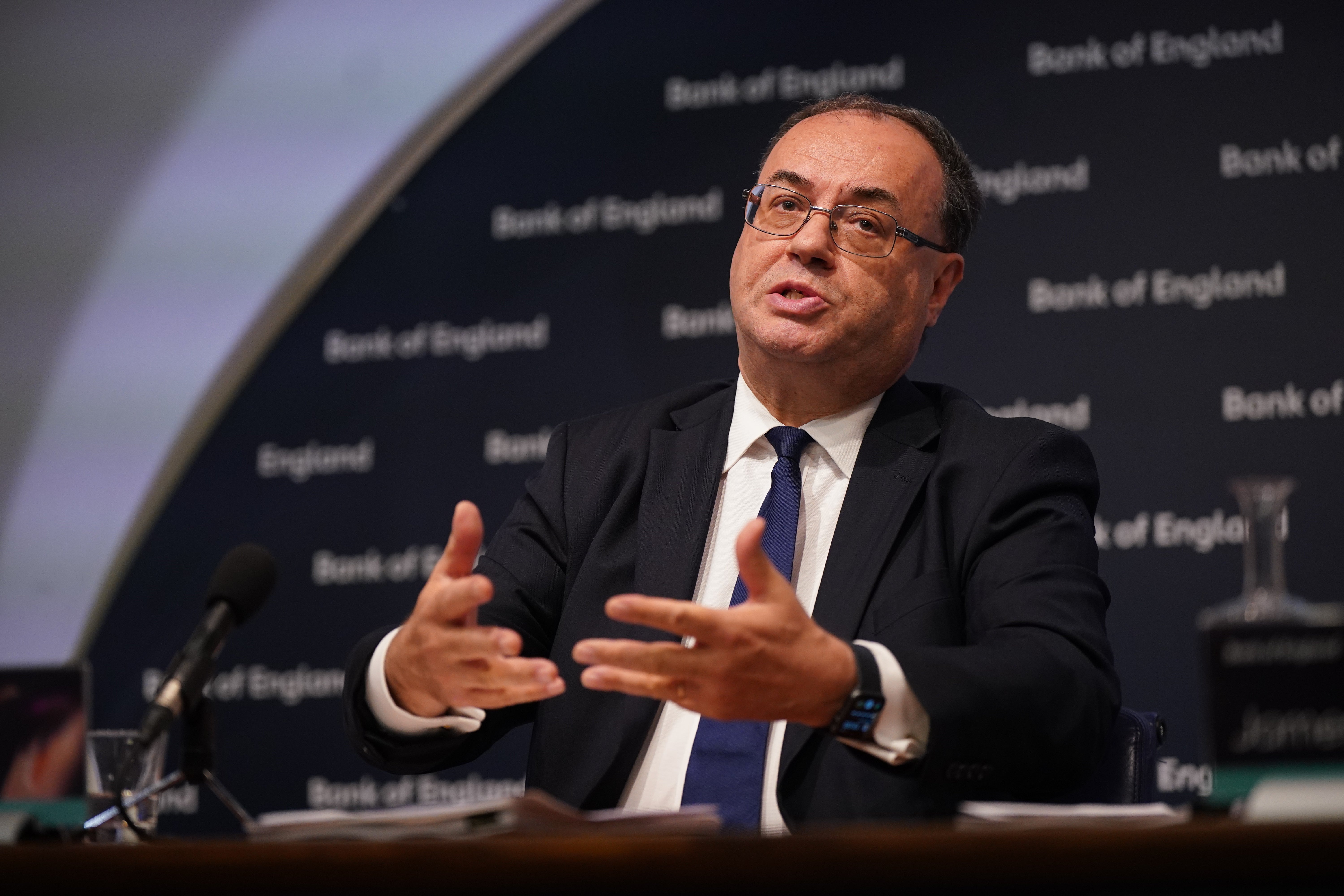Britain ‘already in recession’ says Bank of England as interest rates rise by 0.5%
The UK interest rate is now at its highest level since 2008


A 0.5 percentage-point rise to interest rates announced on Thursday was smaller than expected – but will nonetheless add nearly £600 to the annual average tracker mortgage and experts are predicting more rises to come.
The Bank of England’s move to deliver 2.25% defied market expectations and came despite the US Federal Reserve announcing its third 0.75-point hike in a row.
It said it now expects a 0.1 per cent fall in GDP over the current quarter, indicating that Britain is in a recession.
The rise takes rates to their highest since December 2008 – from 1.75%, in an effort to grapple with big increases in the cost of living.
In committee minutes, it said the “tight labour with wage growth and domestic inflation” above targets called for a “forceful response”.
Five members voted to raise the Bank rate by 0.5 percentage points to 2.25 per cent, three members preferred to increase the Bank rate by 0.75 percentage points, to 2.5 per cent, and one member preferred to increase the Bank rate by 0.25 percentage points, to 2 per cent.
The Bank reduced its inflation forecast in the announcement, predicting it will peak at 11 per cent in October, down from 13 per cent in their last forecast. The revision comes after prime minister Liz Truss announced a freeze on the energy price cap – a move that is expected to limit inflation.
Martin Beck, EY Item Club’s chief economic adviser, said: “The MPC’s decision to forgo a bigger rise in rates makes sense.
“The cap on energy bills will significantly reduce the prospective peak in inflation, as well as bearing down on households’ inflation expectations. And the price of oil, gas and many other commodities have continued to retreat from recent highs, which should contribute to inflation falling back significantly next year.”
But he added: “With the mini-Budget likely to deliver some sizeable tax cuts, September’s increase in rates may not be the last rise this year though.”
He is forecasting rate rises in both November, when the Bank will release its next set of forecasts, and December as it looks to rein in more widespread inflation in the economy with wages surging and the government’s tax cuts set to add to inflation pressures.
This will see rates peak at 3% to 3.25% at the turn of the year, according to Mr Beck.

The Bank itself admitted in the minutes of the rates meeting that it believes the energy support package, while trimming the inflation peak, would add to demand pressures and therefore push up inflation.
In response, it tweaked its guidance to state that “should the outlook suggest more persistent inflationary pressures, including from stronger demand, the committee will respond forcefully, as necessary”.
Ellie Henderson, at Investec, cautioned that “ultimately, we think this will result in higher rates for longer”.
She added: “The real question, and the bigger communications challenge, will arise at November’s meeting, when the committee will have the full details of the fiscal package and the opportunity to reflect their impact in its economic projections.
“How the monetary policy committee will navigate tightening in such an environment, when conditions may push it to a diverging policy path with the government, is yet to be seen.”
Mortgage borrowers whose deal directly tracks the base rate will see their payments increase by about £49 per month on average as a result of Thursday’s base rate hike.
The figures, from trade association UK Finance, also showed that a borrower on their lender’s standard variable rate will typically have a monthly increase of just under £31, adding up to about £370 per year.
Nearly four-fifths (78%) of residential mortgages outstanding are fixed rates, so these borrowers will not see the immediate impact of the base rate hike.
But, if they have been safely locked into their home loan for a while, they may find they get a bill shock when they do eventually re-mortgage.
Tim Bannister, Rightmove’s housing expert, said: “Although the majority of people are on fixed-rate mortgages, there’s a looming concern for those with their terms due to end over the next six months or so as interest rates continue to creep up.
“It’s likely that those who choose to fix again will find that rates have doubled in some cases since they last locked in, and so despite paying down some of their debt they could find their new monthly mortgage payments are higher, even if they’ve moved into a lower LTV [loan-to-value] bracket and have built up equity.
“They will now face the tough decision of moving to a tracker mortgage in the hope that interest rates drop again soon, or taking another fixed deal for a bit more certainty on their outgoings.”
The latest hike could also make it more of a struggle for first-time buyers to get on the property ladder.
Rightmove said first-time buyers typically face scraping together £22,409 if they want to raise a 10% deposit on a home, up from £14,135 10 years ago.
There has been speculation this week that a stamp duty cut may be on the cards, although some commentators have suggested this could push house prices up further.
Nathan Emerson, CEO of Propertymark, said: “Recent rises have been so widely spoken about that this has fed directly into consumer sentiment and has left some people uneasy about moving home, but those looking to enter the market should not be spooked by this. Despite increases, the majority of buyers and sellers are taking advantage of the cooling-off in house prices and the slight easing in competition, and they continue to enter a strong and healthy market.”
The Bank of England was originally set to announce its decision on 15 September but delayed this for a week owing to the Queen’s death.
Join our commenting forum
Join thought-provoking conversations, follow other Independent readers and see their replies
Comments


Bookmark popover
Removed from bookmarks